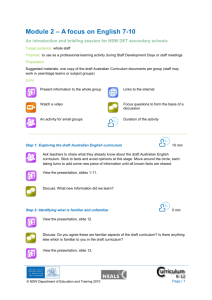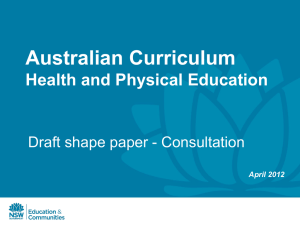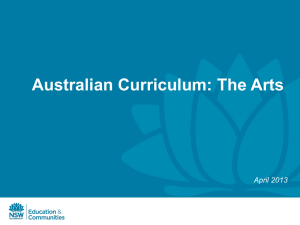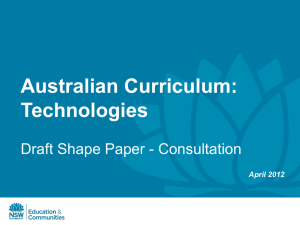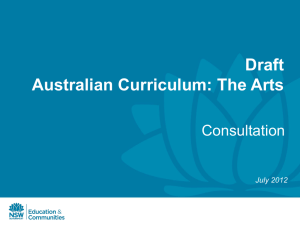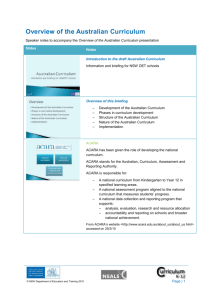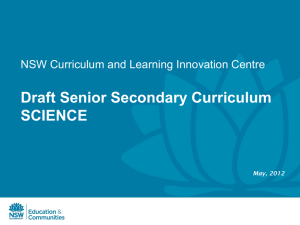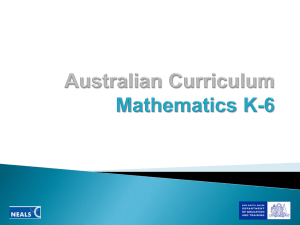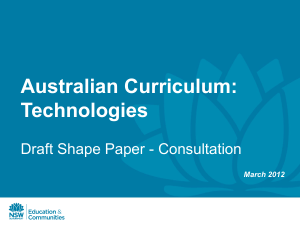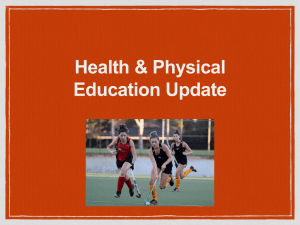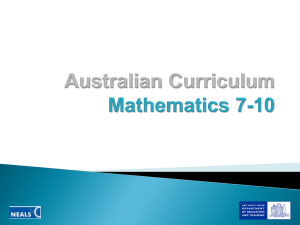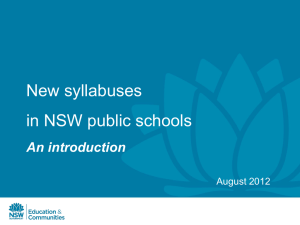Powerpoint - Australian Curriculum Studies Association
advertisement
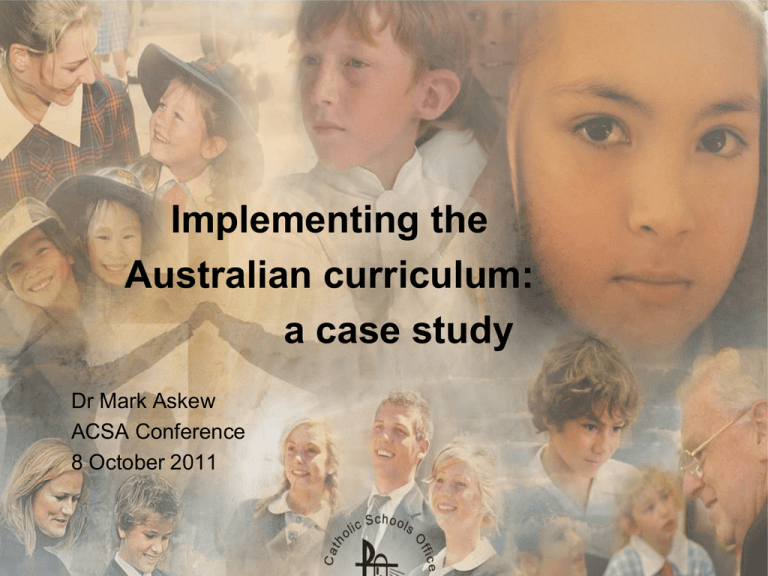
Implementing the Australian curriculum: a case study Dr Mark Askew ACSA Conference 8 October 2011 Some thoughts from the conference: • The persistence of the influence of the English Public School curriculum; (Jane Kenway) • How do schools (and school systems) position themselves in relation to the Australian curriculum? (Jane Kenway) • The AC as a “world class curriculum”; (Peter Hill) • Curriculum is a deceptively complicated topic; (Lyn Yates) Implementing the Australian curriculum: a case study • The context of Broken Bay • Progress to date on exploring the Australian curriculum • Future plans and challenges Isabella Rosson 1789 Mary MacKillop’s Australian Curriculum First Australian Curriculum: St Cecilia’s Wyong In 1909: 650 Sisters, 117 schools, 12 500 students. Broken Bay context • A Catholic school system of almost 50 schools • A school system of considerable diversity: socioeconomic; multicultural; Indigenous • A well articulated values base: the Catholic Worldview • Professional learning focus on Quality Teaching Framework (Newcastle) and Leading Learning (Auckland) The Quality teaching Framework Three dimensions: •Intellectual Quality •Quality Learning Environemnt •Significance Leading Learning initiative: • With the University of Auckland’s Centre for Educational Leadership (UACEL) for two years. • Professor Helen Timperley: focus on the importance of leading teacher professional learning. • Teacher Inquiry and Knowledge Building Cycle and Practice Analysis Conversation: improving teacher learning and practice to improve student outcomes. • A collaborative process with school leadership teams to achieve the goals through School Improvement Plans. • Focus on communication skills, data analysis and goal setting to improve learning outcomes. Australian and NSW context: Hobart 1989; Adelaide 1999; Melbourne 2008. • In the 21st century Australia’s capacity to provide a high quality of life for all will depend on the ability to compete in the global economy on knowledge and innovation. Goals: • Australian schooling promotes equity and excellence. • All young Australians become: successful learners confident and creative individuals active and informed citizens. ACARA Curriculum Model Learning area knowledge and skills General capabilities Perspectives/Priorities • Learning area knowledge and skills (e.g. English, Maths, Science, History) • General Capabilities: Literacy Numeracy ICLT Ethical Behaviour Intercultural Understanding Critical and Creative thinking Personal and Social competence • Cross Curriculum Priorities: Indigenous Asian Sustainability • Catholic Worldview? Cross Curriculum Priorities In a context of internationalisation: Focus Priority National Indigenous culture and history Regional Asia and Australia’s engagement with the region Global Sustainability Australian Curriculum Implementation K-12 (2009-15) Phase 2 development consultation and publication 2010-2011 AC Shape Papers AC Design Paper 2007 2008 2009 Phase 3 development consultation and publication 2011-2012 Phase 1 development consultation and publication 2009-2010 2010 2011 Phase 3 implementation to commence from 2013, with significant progress by 2015 Phase 2 implementation to commence from 2012, with significant progress by 2014 Phase 1 implementation to commence from 2011, with significant progress by 2013 2012 2013 2014 2015 NSW Board of Studies • Broken Bay is a registered school system under the 1990 NSW Education Act • In NSW teaching programs must be based on NSW Board of Studies syllabuses • NSW syllabuses will be developed for the Australian curriculum • In NSW the K-10 syllabuses in English, Maths, Science and History will not be required to be taught until 2014 • Progress to date ... Broken Bay process: • Reference groups of education officers; school leaders and classroom teachers established in each of the phase one areas to engage with ACARA documents; • Once NSW draft syllabuses available, small groups of expert teachers developed sample scope and sequence documents and possible teaching programs • A consultation with learning support teachers was also organized. Results of the consultation: General concerns: There is a general lack of consistency between each of the four draft syllabuses in terms of the: • layout and formatting of the syllabus content • the use of learn to and learn about statements English teachers were most concerned with differences in layout and structure between K-6 and 7-10 components of the syllabus. There is strong sentiment that the English, Science and to a lesser extent History draft syllabuses failed to deliver a K-10 curriculum. In contrast, the Mathematics syllabus was the only document that demonstrated an authentic K-10 approach. The hybrid nature of the draft documents promotes uncertainty: • The precise role of the course outcomes is unclear. • The lack of explicit learn to and learn about statements do not adequately support the ACARA content descriptions. • The inclusion of the additional NSW Cross Curriculum Areas at the expense of the ACARA General Capabilities creates an additional layer within the curriculum. • • How do schools (and school systems) position themselves in relation to the Australian curriculum? (Jane Kenway) • A significant opportunity to reinvigorate the curriculum. In the context of: • Catholic Worldview • Quality Teaching Framework • Leading Learning • Understanding by Design approach Understanding by Design • “Backwards design” steps: • Design appropriate learning outcomes/goals • Identify exactly what achieving the outcomes might look like ... the evidence/assessment • Plan learning experiences to help students get there Future plans and challenges … a often a challenge and a risk • Focus on the disciplines • Possibilities of on line resources • Risk of continuing as usual (Keep calm and carry on) • Implementing the Australian curriculum as a Catholic system in NSW How do schools (and school systems) position themselves in relation to the Australian curriculum? (Jane Kenway)
